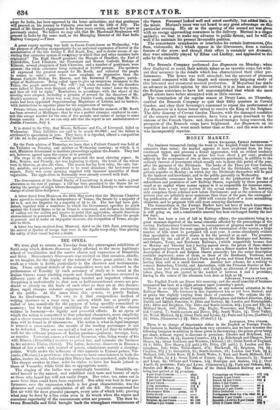THE OPERA.
We were glad to return on Tuesday from the extravagant exhibition of florid song which Roberto Devereux lately afforded, to the more legitimate school of vocalization and the native charm and expression of Brambilla and Grisi. Mercadante's Giuramento was revived on that occasion, chiefly, as we imagine, for the display of the talents of these great artists; for the work as a whole is feeble, particularly in the choruses and instrumenta- tion. These original defects of the composition were not softened in the performance of Tuesday by such accuracy of study as is usual at the Italian Opera; many clashing sounds and discordant cadences occurred in different parts of the work, indicating hurried and imperfect rehearsal. Surprising it undoubtedly is, that new or half-remembered scores are pro- duced so closely on the heels of each other as they are at this theatre: these rapid changes enhance enjoyment and maintain the excitement of the public. At the same time, this system, so purely Italian, has its disadvantages. We owe to it that compendious method of writing choruses to a tune sung in unison, which has so greatly pre- vailed of late, manifestly for the purpose of being speedily committed to memory; but for that object sacrificing the true vocation of the chorus written in harmony—its dignity and powerful effects. In an opera of which the action is committed to four principal characters, more simplicity and a closer connexion between the music and situation might be expected than will be found in II Giuramento. The action is what in legal language is termed a cross-action: the morale of the leading personages is not to be defended. They are one and all a bad set; and yet they do tolerably well for the ordinary purposes of Italian passion—jealousy, revenge, love, or murder. Fornasari enacts a Count of Syracuse, who, being weary of his wife Bianca, (Brambilla,) resolves to poison her, and commits the business to his mistress Elaisa, (Grisi). The latter, however, discovers in Bianca a friend of her youth; and, instead of poison, administers merely a sleeping- potion. While under the influence of this narcotic in Elaisa's palace, Vis- cardo, (Moriani,) a gentleman who appears to have some interest in both the ladies, rushes in, and, believing that Bianca has been murdered, stabs Elaisa. The sleeper awakes in time, scion lea regles, to have her bands joined to those of Viscardo; while Grisi dies to appropriate music.
The singing of the ladies was surprisingly beautiful. Brambilla ex-. erted herself to the utmost, and exhibited such taste and beauty of style as those who heard her will not easily forget. Her voice, too, came out in more force than could have been expected. But what was best in her per- formance, save the expression which is her great characteristic, was the Clearness and exquisite articulation of all she did. She ornamented her first air with the most graceful passages, every note of which told; proving what may be done by a fine voice even in its wreck when the repose and Conscious superiority of the consummate artist are present. The duet be- tween Brambilla and Grisi brought back the triumphant reminiscences of the Opera. Fornaaari looked well and acted carefully, but added little to the music. Moriani's tenor was not heard to any great advantage on this particular evening. Ills air at the opening of the second act was given with an energy approaching coarseness in the delivery. Moriani is a singer unlikely, we fear, to make any advance in public favour, and he will do well if he maintain his present favourable position.
The concertante symphonies or interludes for certain instruments, (the flute, violoncello, &c.) which appear in the Giuramento, form a curious feature of the score; and though their effect is certainly not dramatic, they were admirably played by Ribes and Lindley, and applauded to the echo by the audience.


























 Previous page
Previous page